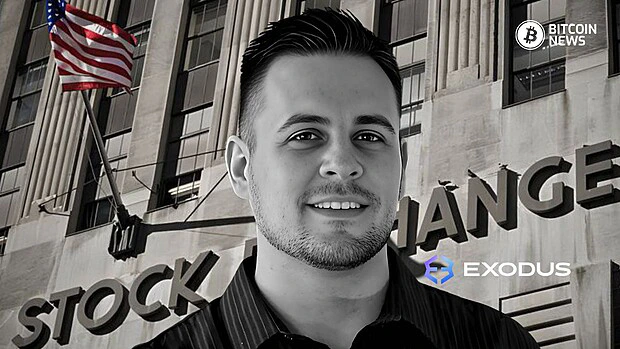Exodus Movement, the software developer behind the popular non-custodial digital asset wallet Exodus, prepares for its public listing on the New York Stock Exchange (NYSE).
The move marks a significant milestone not only for Exodus but also for the broader digital asset industry as it plans to utilize blockchain technology to tokenize stocks.
The approval for Exodus to list its common stock on the NYSE comes after rigorous scrutiny by regulatory bodies, including the U.S. Securities and Exchange Commission (SEC).
CEO and Co-founder of Exodus, JP Richardson, expressed his excitement about the listing, stating:
“We believe the uplisting will broaden the awareness of Exodus.”
Exodus Movement’s Listing On NYSE
Established in 2015, Exodus gained fame for its software enabling storage of bitcoin alongside a diverse list of other digital assets across multiple chains, empowering users to retain private keys independently.
By April 2021, the Delaware firm secured $60 million in just five days through Regulation A, with 92% from non-accredited investors.
Exodus’s common stock, with the ticker symbol “EXOD,” will begin trading on the NYSE American exchange on May 9, 2024. This move comes after the company’s successful stint on the Over-the-Counter (OTC) market, where it traded under the same ticker symbol.
Richardson highlighted the benefits of the uplisting, noting:
“Trading on the NYSE American will allow Exodus to create greater long-term value for our stockholders by increasing our presence within the investor community and, in turn, increase liquidity.”
The firm also announced its decision to tokenize its common stock on Algorand blockchain, hoping this would set Exodus apart from traditional companies listed on stock exchanges.
The firm believes this innovation not only streamlines the trading process but also opens up new possibilities for investor engagement and corporate governance. Richardson elaborated on the advantages of blockchain-powered stocks, stating:
“It works just as simple as cryptocurrency which is phenomenal from a usability standpoint. Beyond that, when you think of implications like dividend payouts, we could pay out dividends with USDC to stockholders on a blockchain.”
Exodus is not the first company to embrace blockchain technology for its stock offerings. In recent years, other notable players in the digital assets space have ventured into the public stock market.
Coinbase, a leading exchange, made headlines in 2021 when it opted for a direct listing of its Class A common stock on the Nasdaq Global Select Market. Similarly, Bakkt Holdings, a digital assets platform, went public through a SPAC merger with VPC Impact Acquisition Holdings.
Organizations’ embrace of blockchain-powered stocks signals a shift in perspective, as they believe what they perceive as “distributed ledger technology” could help revolutionize traditional financial markets.
Richardson expressed optimism about the future of publicly traded digital assets, stating:
“We want to see a future where eventually, traditional stocks are powered by the blockchain. I think that’s what’s so great about all this hard work that we’re doing.”
Exodus’s journey to the NYSE is not without challenges, as regulatory scrutiny on digital asset projects and developers intensifies. Recent crackdowns on self-custodial bitcoin wallet providers by regulatory agencies have raised concerns within the industry.
Related: Phoenix Wallet Withdraws from US Market Amid Regulatory Pressure
However, Richardson remains confident in Exodus’s compliance with regulatory standards, emphasizing, EXOD has met the qualifications set by the SEC and is authorized for trading on NYSE American as well.
Despite the regulatory landscape, Exodus continues to report impressive growth and performance metrics. In the first quarter of 2024, the company achieved a revenue of $29.1 million, marking a significant 118% increase compared to the same period last year.
Additionally, Exodus reported approximately 1.69 million monthly active users during the first quarter, underscoring its widespread adoption within the digital asset community.










